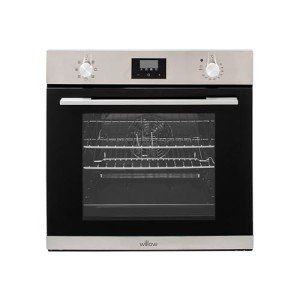An Intermediate Guide For Built-In Ovens
The Comprehensive Guide to Built-In Ovens: Maximizing Kitchen Efficiency and Style
Built-in ovens are a necessary feature in modern-day kitchen areas, merging functionality with streamlined style. They supply a smooth appearance, boost space effectiveness, and frequently come with sophisticated features that raise the cooking experience. This article will dive into the different types of built-in ovens, their advantages, vital factors to consider during purchase, and maintenance suggestions.
What is a Built-In Oven?
A built-in oven is designed to be housed within cabinets, providing an integrated appearance that conserves counter area and improves the aesthetics of a kitchen. Unlike freestanding ovens, built-ins offer flexibility in regards to placement and can be selected to match the kitchen's style.
Kinds Of Built-In Ovens
There are a number of kinds of built-in ovens, each dealing with different cooking requirements:
Type
Description
Suitable Use
Single Oven
A standard oven with one cooking compartment.
Everyday cooking, baking.
Double Oven
Two separate oven compartments, enabling multi-tasking.
Large meals, multi-course cooking.
Wall Oven
Installed at eye level, usually with sophisticated functions.
Space-saving designs, ergonomic cooking.
Convection Oven
Features a fan to flow hot air, cooking food evenly.
Roasting, baking, and more.
Steam Oven
Uses steam for cooking, keeping moisture and nutrients.
Healthy cooking, baking bread.
Microwave
Combines microwave and regular oven functions.
Quick meals, reheating.
Benefits of Built-In Ovens
Built-in ovens use various advantages, which makes them a popular choice amongst property owners. Some crucial advantages consist of:
- Aesthetic Appeal: They can fit flawlessly into kitchen cabinets, producing an advanced and consistent look.
- Area Efficiency: By using vertical space, they assist optimize kitchen utility, especially in smaller areas.
- Advanced Features: Many come geared up with clever technology, self-cleaning alternatives, and accuracy cooking features.
- Improved Accessibility: Wall ovens can be positioned at eye level, lowering the requirement for bending and making it easier to monitor cooking progress.
- Personalized Options: Built-in options can be found in numerous sizes, surfaces, and designs, enabling customized kitchen design.
Considerations When Choosing a Built-In Oven
When selecting a built-in oven, there are a number of factors to consider to make sure that the home appliance aligns with the user's cooking choices and kitchen layout:
- Size and Capacity: Measure the installation space to ensure the selected oven fits. Think about the oven capacity based on cooking requirements.
- Kind of Cooking: Think about the preferred cooking techniques— do you bake, roast, steam, or cook rapidly? This will identify the type of oven to pick.
- Features: Evaluate clever features, temperature level probes, multiple cooking modes, and cleansing choices.
- Energy Efficiency: Look for energy rankings to save money on energy costs, specifically if the oven will be used frequently.
- Spending plan: Built-in ovens can vary considerably in price, so it's important to establish a budget plan and consider long-lasting financial investment choices.
Upkeep Tips for Built-In Ovens
To lengthen the life of a built-in oven and maintain its performance, regular maintenance is crucial. Here are some useful pointers:
- Cleaning: Regularly clean down the interior and outside surface areas. Use specialized russell hobbs built under double oven for stainless steel surfaces.
- Self-Cleaning: Utilize the self-cleaning function regularly to keep the interior pristine; however, prevent regular usage to prevent wear and tear.
- Inspect Seals: Inspect the door seals for any damage to prevent heat loss.
- Usage Safe Cookware: Ensure that baking sheets and pans work with the particular type of oven to prevent damage.
- Routine Inspection: Schedule professional upkeep checks at least when a year to guarantee whatever functions efficiently.
Frequently Asked Questions About Built-In Ovens
Q1: How do I select the ideal size built-in oven for my kitchen?A: Measure
the designated area for the oven and consider the total capability you require based upon your cooking routines.
**Q2: Are built-in ovens simple to install?A: Installation can be complex and often requires professional support, particularly for electrical and gas connections. Q3: How often ought to I clean my built-in oven?A: It's a good idea to clean the oven monthly and utilize the self-clean function regularly based upon use frequency. Q4: Will a built-in oven increase the worth of my home?A: Yes, a premium built-in oven can enhance the kitchen's appeal, possibly increasing home worth. Q5: Can built-in ovens
be used for all kinds of cooking?A: Most built-in ovens can manage a variety of cooking techniques, but customized types, like steam or convection ovens, master particular locations. Built-in ovens are a fantastic addition to modern cooking areas, mixing performance with design. With their multiple types, advantages, and personalized alternatives, they accommodate diverse culinary
needs while boosting overall kitchen design. By considering size, type, functions, and maintenance, house owners can select a built-in oven that serves their cooking design and way of life efficiently. Investing in a built-in oven not just elevates kitchen looks however also changes the cooking experience, making meal preparation more satisfying and effective.  **
**